
In her 2003 novel
Oryx and Crake, Margaret Atwood describes a future after humanity had been almost entirely wiped out by a plague. Jimmy, aka Snowman, lives in a wasteland populated by genetically engineered animals gone wild and the Crakers, a race created to be biologically superior to humans but childlike in their simplicity and grace. Snowman's previous life was one of privilege, lived inside the compounds run by the genetics companies and security firms, and he ruminates on his memories and the reasons for humanity's demise. The
New Yorker marveled, "Towering and intrepid....Atwood does Orwell one better."
The Year of the Flood opens with two more survivors, Toby and Ren — one defending her position at a defunct health spa, the other trapped in a bio-isolation room at a brothel. Both have previously been members of God's Gardeners, an eco-religious sect dedicated to living sustainably in an increasingly degraded and stratified society, and the novel charts their experiences leading up to the catastrophe. The Year of the Flood masterfully depicts a very different side of the dystopia. Darkly funny, incredibly believable, and surprisingly hopeful, Atwood's new novel is one of her very best.
÷ ÷ ÷
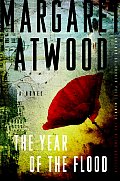 Jill Owens: How did you decide to go back to the world of Oryx and Crake for The Year of the Flood?
Jill Owens: How did you decide to go back to the world of Oryx and Crake for The Year of the Flood?
Margaret Atwood: There are a couple of answers to that. Number one, everybody was asking me what happened right after the end of Oryx and Crake. Since I didn't know, I had to write another book in order to find out.
Number two, a lot of people, having asked me for years, "How come you write so much from the point of view of women?" since I wrote it from the point of view of a man, now asked, "Why did you write it from the point of view of a man?" [Laughter] So you can't win that one.
I thought, All right, what would it be like, if it were from the point of view of women? Also, what would it be like if we went into the world that is something Jimmy only sees out a train window? In other words, the unprotected urban space, unlike his protected urban space. What would that be like? And also, what would the God's Gardeners, who appear in the margins of Oryx and Crake, look like up close? What would that religion actually be like?
All of those things were pretty interesting to me, and there were a couple of characters I was interested in as well, notably Amanda, who was in Oryx and Crake.
Jill: I reread the two books back to back last week, and I was struck by the difference in tone between them.
Atwood: Jimmy is narrating one of them, and he's not a happy bunny.
Jill: I was going to ask if the difference in tone was related to their gender...
Atwood: Well, he's not unhappy because he's a man. He's unhappy because he's not valued in the society in which he has grown up, nor by his parents, particularly.
Jill: And he's isolated.
Atwood: Yes, particularly at the beginning when he's living in a tree.
Jill: He's about as isolated as you can get, really.
Atwood: He does have these other humanoids nearby, but they don't understand him. So, in fact, his state is the emotional state of a certain number of young men who think they're living in trees and that nobody understands them. [Laughter]
Jill: I ran across an older poem of yours, "Elegy for the Giant Tortoises," which begins: "Let others pray for the passenger pigeon, the dodo,/ the whooping crane, the eskimo,/ everyone must specialize," and I thought, in the new book, you're doing the opposite. You're praying for all the extinct animals.
Atwood: As many of them as I could cram in. It's quite a list.
Jill: Do you see that poem as a precursor at all to the new book?
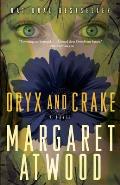 Atwood: It's all part of the same group of interests that have been with me for a long time. Tracing it back, I did grow up amongst the biologists. They were what we would now call early environmentalists; they were early Sierra club, for instance. This kind of interest has been around for a very long time except that it was seen as rather minor ? although Teddy Roosevelt, for instance, was a big supporter. It has waxed and waned, during the late nineteenth and twentieth centuries.
Atwood: It's all part of the same group of interests that have been with me for a long time. Tracing it back, I did grow up amongst the biologists. They were what we would now call early environmentalists; they were early Sierra club, for instance. This kind of interest has been around for a very long time except that it was seen as rather minor ? although Teddy Roosevelt, for instance, was a big supporter. It has waxed and waned, during the late nineteenth and twentieth centuries.
I would say environmentalism had some earlier moments where people were preserving parks in the late nineteenth and early twentieth centuries. It had probably a low moment in the eighties and nineties of the past century. It had an up moment in the seventies, and it's having an up moment now. But the thinking itself has been around for quite awhile. The people doing the counting and the numbers have been around for quite a while too, and it's true that in 1972, the Club of Rome said, "If we don't change our behavior, in 40 years we're going to be in the following mess." We didn't change our behavior, and that is the following mess that we are now in. So it's not as if people weren't warned and were not told. There was no political will to change anything.
Jill: Adapting and creating the theology for the Gardeners must have been fun, I would think.
Atwood: It was fun, but you know, it's also a trend. There is already with us today a Green Bible. It's got tasteful linen covers, ecologically correct paper, an introduction by Archbishop Tutu, and the green parts are in green. I think that certain wings of Christianity are returning to their roots, and those roots were more biophilic than they became in the seventeenth century, when a mechanistic view was taken of animal life.
Strangely enough, it was Charles Darwin who bucked that trend, in his work on animal emotions. The mechanistic view had it that animals were just automatons. They didn't really have emotional lives; they just had knee-jerk reactions and they were like machines. He denied that. He said they have emotions that are very similar to our emotions. By animals, he didn't mean clams. He meant mammals.
Jill: I like Adam One's soft spot for sharks.
Atwood: [Laughter] You have to include them. They are alpha predators, and removing them does have a horrible effect on the fish life in the oceans.
Jill: That made the sermons feel very genuine, in some ways.
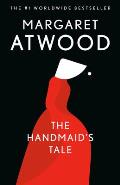
Atwood: It is an answer to William Blake's question. "Did he who make the lamb make thee?" That answer would be yes.
Jill: What was your model for the hymns?
Atwood: The model for the hymns were in the Anglican United Church hymnbook. The hymn tradition is pretty interesting, because hymns are not poems, as such. They're not primarily meant to appeal to the aesthetic sense. They're meant to be communally sung on specific occasions for celebration or confirmation of belief. Therefore, if you read through the entire hymnbook, you'll find a lot of infelicitous verses ? lines that in a poem, you would probably think, "That's a really bad line."
I wanted my hymns to have some of those. I wanted them to be like real hymns. And I wanted them to have a hymn structure, and a hymn structure is not blank verse. They rhyme and scan so that people can sing them communally. That's why they rhyme and scan. I wanted them to be well within that tradition, which I feel they are.
The other thing about hymns is that if you're not part of that belief system, they usually seem pretty strange.
Jill: How did you develop the belief system for the God's Gardeners?
Atwood: The model for literary criticism is biblical exegesis, in which you take a passage and you essentially deconstruct it. That's been going on for thousands of years. It's in commentary on the Torah, as we know. One line of text, five pages of commentary. [Laughter]
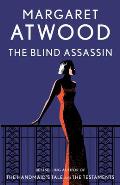 So people have been interpreting and reinterpreting not only that set of writings but the Koran, the Hindu texts, the sayings of Buddha, etc. All of these things are reinterpreted by each different spin-off group and in each generation. The Gardeners are doing the same. (Why do I know so much about this? You can't go through English literature from start to finish as we did once upon a time without having to know it.)
So people have been interpreting and reinterpreting not only that set of writings but the Koran, the Hindu texts, the sayings of Buddha, etc. All of these things are reinterpreted by each different spin-off group and in each generation. The Gardeners are doing the same. (Why do I know so much about this? You can't go through English literature from start to finish as we did once upon a time without having to know it.)
Looking at the specific parts of the text that the Gardeners pick out, there are other interpretations possible, i.e., not the standard ones. If, instead of looking at it from the point of view of man, you look at it from the point of view of the animals, it all looks quite different.
For instance, after the Noah's flood episode, God has just said, Man is evil from his youth. In other words, there's nothing you can do about that. And God makes a covenant with all flesh, so not just people. You can't make a covenant with an inert object. A covenant has to be made with a living, sentient being who can understand that a covenant is being made. Therefore the animals must have been like that.
The covenant went on, but one point could be: look out for man. If you're looking at it from the point of view of man, you think, "Okay, I've just been handed a cart blanche, I can do whatever I like." If you look at it from the point of view of the animals, it says, "This is someone who is evil from his youth and powerful, so run away very fast. Get out of the way. Now." [Laughter]
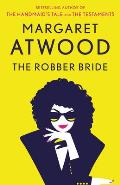 Jill: That would have been good advice.
Jill: That would have been good advice.
Atwood: If you look at it from the point of view of the animals, that's what it is. It's, "Okay, I realize I've made these people that are pretty bad; sorry about that. Just stay out of their way."
Jill: How realistic is the science behind this book? I heard an interview with you after Oryx and Crake where you said that most of this is already possible, and I was wondering how far it had come since then.
Atwood: Pretty realistic. It's either possible or they're working on it. I think they've made a breakthrough now, which they hadn't when I wrote Oryx and Crake, called the knock-out gene breakthrough, which will allow them to grow a kidney just for you in a pig. And if they can grow a kidney just for you in a pig, why wouldn't they grow some hair for you on a sheep?
There are many possibilities. We have opened the biggest toy box in the world. We are already mixing and matching. After the glowing green rabbit, which we already had when I wrote Oryx and Crake, we made some glowing green fish (and red, and blue) that light up in the dark. We also made, I believe, a glowing monkey. I'm not sure those things would do really well in the wild, if there were a lot of nocturnal predators.
Jill: They might be awfully visible.
Atwood: They would be visible if what they glowed with was detectable to those predator's eyes.
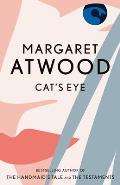 Jill: I have to admit I sort of coveted the jellyfish bracelet. [Editor's note: Atwood describes a bracelet full of tiny, living jellyfish, "opening and closing themselves like swimming flowers."]
Jill: I have to admit I sort of coveted the jellyfish bracelet. [Editor's note: Atwood describes a bracelet full of tiny, living jellyfish, "opening and closing themselves like swimming flowers."]
Atwood: I think the jellyfish bracelet would be really cool. [Laughter] It could be done. Out of all of those things, what is it that I think isn't very plausible? The lion and the lamb. You'd have to work somewhat hard to get that done, but you could do it.
Jill: And with sufficient motivation, like religious motivation ?
Atwood: Exactly. With sufficient motivation, you could certainly do something that would at least approach a lion and a lamb. But how it would come out... well, as we can see, it didn't come out the way they wanted it to.
Jill: As I was reading both books, I was thinking of a recent Harper's article about how math and science are the only things that will be left in schools, if things continue the way they're going, and the arts continue to be devalued and cut from curriculums. Do you think that's the way we're headed?
Atwood: What schools do is one thing. What human beings do is another. If you look at Dennis Dutton's book called The Art Instinct, he speculates that art is an evolved adaptation that gave us an edge in the 80,000 generations we've spent in the Pleistocene. You might be able to eliminate art from schools, but you're not going to eliminate it from people. What will happen then, of course, is that if you can't get it in schools, other institutions or groups or affiliations or places will spring up where you do get it, because people will do it anyway. That does seem to be part of the basic set that we come with.
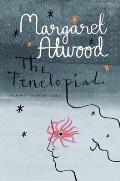 There are some people who are, for instance, tone-deaf and don't understand it, but narrative would have been a real asset and still is a real asset. It gives you a survival edge. It certainly would have given you a survival edge when the things at issue were, "Where did we find the giraffe last year? How did we capture it? Why did George get eaten by a crocodile at that particular place in the river? Maybe we shouldn't go wading there." [Laughter] Instruction and warning ? the ability to do those things would have really been a help when times were tough and you needed to pass that information along.
There are some people who are, for instance, tone-deaf and don't understand it, but narrative would have been a real asset and still is a real asset. It gives you a survival edge. It certainly would have given you a survival edge when the things at issue were, "Where did we find the giraffe last year? How did we capture it? Why did George get eaten by a crocodile at that particular place in the river? Maybe we shouldn't go wading there." [Laughter] Instruction and warning ? the ability to do those things would have really been a help when times were tough and you needed to pass that information along.
Jill: The Crakers have that instinct, too; they want someone to tell them stories.
Atwood: Yes. That seems to have not been eliminated from them. So then the question is not whether we have art; it's what kind of art we have.
Jill: In Oryx and Crake, Snowman remembers and catalogs forgotten words, while in the new book, the God's Gardeners remember and honor the extinct animals. It seems like in both books there's a grieving process for a vanishing world.
Atwood: Oh, I would think so. I think that goes on a lot anyway when the rate of change is rapid. If there isn't any rate of change at all, it might be the opposite, i. e., "I'm bored, why doesn't anything ever change?" But certainly, when things change out of all recognition, that's going to be the reaction of a lot of people.
Jill: It was underscored for me in part by the image of the pigs' possible funeral.
Atwood: Yes, the pigs' possible funeral. The elephants actually do that, so I wonder, since the pigs have had human cortex tissue implanted into them, when they would develop funerals. It's not pig behavior at the moment. They would be more likely to eat their fallen comrade. But maybe these pigs are different.
Jill: Something that comes up in The Year of the Flood and in Oryx and Crake, too, is how beautiful the world can seem when you think you're about to die, when adrenaline kicks in.
Atwood: A lot of people seem to have had that experience.
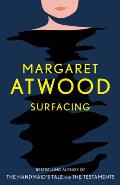 Jill: Toby wonders why it's built in, how is this useful to humans, and I did, too.
Jill: Toby wonders why it's built in, how is this useful to humans, and I did, too.
Atwood: I don't know the answer to that question. I think if you really want to take it a little bit further, it would be, "Okay. You're in a lot of danger, person with body. Maybe you'd better make an extra effort, because look what you're about to lose." I don't know whether that makes sense or not; I don't know why that happens. But it does seem to happen.
Jill: In a way, it seems like a question the book as a whole addresses, because that's why the God's Gardeners exist, why they have come into being. They're celebrating the beauty of this world right before it ends.
Atwood: They certainly are. If it's not worth anything, why save it? You could look at it that way. Unless you recognize that about it, why put in the effort?
Jill: At one point, Toby's thinking about the word "daybreak," and wondering what exactly is being broken. That kind of analysis of language that we often take for granted shows up frequently in your novels. What do you think we find when we unpack language that way?
Atwood: We usually find what we find when we unpack anything, which is something at the bottom of the suitcase. It could be a little treasure, or it could be an old piece of fluff. [Laughter]
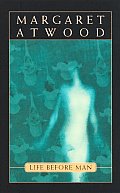 I love that word, "unpack," too. You know, it's very connected to Lewis Carroll. Portmanteau words, portmanteau being a trunk. Portmanteau words for him were a couple of words stuck together, blended, and then you could unpack them into their elements.
I love that word, "unpack," too. You know, it's very connected to Lewis Carroll. Portmanteau words, portmanteau being a trunk. Portmanteau words for him were a couple of words stuck together, blended, and then you could unpack them into their elements.
Jill: Who are some contemporary poets that you admire?
Atwood: Oh dearie me. [Laughter] It's one of those questions I never answer because if you name some names, then the others get very hurt.
Jill: Well, then, who are some non-contemporary poets you admire, or who were influences? Poets whose feelings can't be hurt.
Atwood: My choices are very banal. I am a person who went through a course in the early sixties called Honors English. In Honors English, you started with the Anglo-Saxons and you went all the way through it right up until about 1950. Name anyone, and I've read them. In English literature, that is. In American literature, although I did it in graduate school, I might have missed some. But I'm probably the only person you've ever talked to who has read Longfellow's three verse dramas on the subject of the United States.
Jill: I think that's very possible; at least, no one else has ever brought it up. [Laughter]
Atwood: They're pretty interesting, because it was him trying to figure out, "What is this country? What are the heroic stories about it? How do we formulate this?" He wrote one about the Salem witchcraft trials that was pretty interesting. The Crucible comes out of that same body of history, as does some of Nathaniel Hawthorne's work. It was something that interested Hawthorne earlier, and then Longfellow, and finally Arthur Miller. If you're looking at the intellectual history of a country, it's very useful to know how people were trying to tackle those sorts of problems.
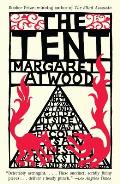 Then Longfellow's got one about the Quakers. The Quakers were a problem for him, which means that the verse drama isn't very good, because he didn't know how to end it. The Quakers were persecuted by the Puritans. In fact, some of them were even hanged, because they were in their more radical phase then, and they were being quite disruptive ? taking off their clothes in church, and accusing people of being corrupt, and other stuff that isn't often appreciated.
Then Longfellow's got one about the Quakers. The Quakers were a problem for him, which means that the verse drama isn't very good, because he didn't know how to end it. The Quakers were persecuted by the Puritans. In fact, some of them were even hanged, because they were in their more radical phase then, and they were being quite disruptive ? taking off their clothes in church, and accusing people of being corrupt, and other stuff that isn't often appreciated.
They were hanging them, and that didn't stop until Cromwell was dead and the Restoration had happened, and the English sent a governor from England to New England. They lost some autonomy, but it was the arrival of that new governor who put a stop to Quaker hanging. So how do we feel about that? Longfellow didn't quite know how to feel about it. We'll hang our own Quakers! Bug off. Leave us alone. [Laughter]
In fact, it is the kind of thing that has troubled the imagination and indeed politics ever since. Do you go into a rather autonomous place that you think is doing unjust things and impose your own rules about what is just? It's a timely subject. It's interesting to know that somebody in the nineteenth century ? in fact, the best known American poet of his generation ? was actually writing about it.
Jill: Now I think I'm going to have to go back and read those dramas.
Atwood: No, you don't. You really don't. Trust me on this one. [Laughter] I mean, you can if you want to. But if you're going to read any of them, read the one about the Salem witch trials, which I think is probably called Giles Corey.
It's very interesting, because the hero of it is a real person. The witchcraft trials allowed spectral evidence. Spectral evidence was that if you were asleep in your bed, and 20 miles away, somebody saw you in their barnyard, that proved you were a witch, because you had the ability to throw your specter and send it out to do your dirty business while you were pretending to be innocent. So they were allowing spectral evidence at the trials, and until they disallowed it, nobody was safe. As soon as you were accused, you were condemned.
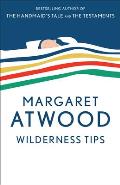 However, you had to plead. By that I mean you had to plead guilty or not guilty. If you refused to plead, they couldn't try you. If they did try you and you were condemned, which it was pretty clear you were going to be, they got your property. Giles Corey, knowing all of this, refused to plead when he was accused. He refused to say guilty or not guilty. The law said that you could then be pressed until you pled. "Pressed" meant they put a lot of stones on top of you and squashed you to death.
However, you had to plead. By that I mean you had to plead guilty or not guilty. If you refused to plead, they couldn't try you. If they did try you and you were condemned, which it was pretty clear you were going to be, they got your property. Giles Corey, knowing all of this, refused to plead when he was accused. He refused to say guilty or not guilty. The law said that you could then be pressed until you pled. "Pressed" meant they put a lot of stones on top of you and squashed you to death.
Jill: I'm remembering this now from The Crucible.
Atwood: Yes. So what Giles Corey did was allowed himself to be pressed to death, thus saving his farm and belongings for his family.
Jill: Was he the only one who refused to plead?
Atwood: He was the only one who did that. And he is said to have said nothing but, "Put on more stones."
Jill: That's a haunting image.
Atwood: It is quite haunting. I connect it in an essay I wrote about Dashiell Hammett with Hammett's similar refusal to speak to defend himself at his trial. Of course, he knew Longfellow; everybody of that generation did. It was he who suggested to Lillian Hellman the title for her play, The Children's Hour. It's a Longfellow poem.
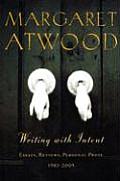 Jill: I honestly didn't know that Longfellow was that influential.
Jill: I honestly didn't know that Longfellow was that influential.
Atwood: In his day, very. He was very, very well known. Anybody of Dashiell Hammett's age would have got him in school and in the library. You can look up my piece on Dashiell Hammett, if you're at all interested; it was published in the New York Review of Books. I think it appears in my book called Writing with Intent, a collection of essays and the like.
Jill: What are you reading these days?
Atwood: Shall I tell you the truth? [Laughter] Yes, I'll tell you a couple of different things that I’m reading. I just finished Wolf Hall by Hilary Mantel, which I really liked a lot. It's about the life and times of Thomas Cromwell, not usually a very popular figure in history books, who was right-hand man to Henry VIII for awhile. Of course, anything about Henry VIII and Anne Boleyn, etc., is really pretty interesting, but nobody has done it from the point of view of Thomas before. I won't say Thomas comes out of it really well, but he comes out of it in a much more human way than he has before. Thomas Moore, on the other hand, who is usually considered quite saintly, is not portrayed as saintly in this book.
Jill: I love Hilary Mantel, but I haven't read that one yet.
Atwood: It's her new one. She really goes to town on it. I expect that there's going to be a number two, because we only get up to the point where Anne Boleyn has had her head chopped off and he's on his way to arrange things with Jane Seymour.
Jill: And what was the other book you were going to mention?
Atwood: This is a confession. I'm reading a book called What Would Google Do? [Laughter] It's pretty interesting. It's really about upcoming configurations in society and business and how the internet has changed people's behavior and expectations.
Jill: I should probably read that book.
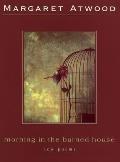 Atwood: Yes! You should. Did you know that I've now learned how to Twitter?
Atwood: Yes! You should. Did you know that I've now learned how to Twitter?
Jill: I did not know that.
Atwood: If you go onto the website, www.yearoftheflood.com, you'll see that there's a Twitter feed on it. And my followers, who now number about seven and a half thousand from a cold start in August, can say some quite fun things to and about me, one of them being, "I love it when old people blog." [Laughter]
So you can go on the Twitter feed, find the tweets, and you can go onto my blog and follow my book tour from the very beginning. When I appear in Seattle, that will be on my blog too.
Jill: Do you enjoy tweeting, shrinking things down to 140 characters?
Atwood: It's a discipline. The real form of the tweet goes back to the telegraph. With the telegraph, you had to condense language because you paid by the letter or the word, I forget which. So it too used those condensed forms of language, although it could not be shared with all of those people at once. But as a thing that you write… I'd say twittering isn't exactly writing, it's more like signaling. It's more like semaphore.
You could say, "Well, we could write haiku on it," which we could. But I don't notice us doing that very much.
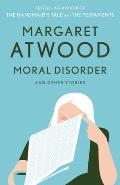 Jill: No, although there is someone who sends out recipes through Twitter.
Jill: No, although there is someone who sends out recipes through Twitter.
Atwood: They must be fairly simple recipes.
Jill: I think they are, and also that she uses extremely condensed words and symbols, so even more like semaphore.
Atwood: She could also probably use TwitPic. Do you know what TwitPic is?
Jill: I don't, no.
Atwood: You work on the net, and I know something you don't! [Laughter] TwitPic is a tool whereby you can turn a photograph or a document into a url that you can put on your twitter entry. Whoever clicks on it then gets whatever it is that you've put up there. It will expand your world. Maybe. Maybe it'll just give you one more thing to worry about.
Jill: I should say to save a little face here that I am not one of the Powell's Twitterers, but I'm sure that they know what TwitPic is.
Atwood: I'm sure they do. They probably also know who Mr. Tweet is. Mr. Tweet is an owl ? or, at least, that's his little logo. I think he's actually a sort and send engine. If you've been recommended to Mr. Tweet ? who is not biologically correct; he should be called Mr. Hoot...
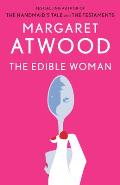 Jill: Tweeting and owls don't generally go together, true.
Jill: Tweeting and owls don't generally go together, true.
Atwood: They do not. But if he were called Mr. Hoot, then his followers would have to be called hooters. They probably confronted that and decided not to do it. [Laughter] If you put Mr. Tweet into your search engine, you can find him; he's very cute. If you somehow get connected with him, he apparently is supposed to recommend you to people that he, in his sort and search engine way, has decided will like you. But I think probably he annoys a lot of people who probably don't like you.
Jill: Is there anything you wanted to get across about The Year of the Flood that hasn't come up?
Atwood: Don't tell the end. [Laughter] I don’t know; what can you say about your own book? It always comes through as kind of fatuous self-advertisement. Here's a good thing to say about it: It's a book. Let's keep it that way. As of today, it's a book. Keep this world inside the covers. Do not let it out.
I spoke to Margaret Atwood on September 25, 2009.